Jackie Leven - Interview
by Benjamin Howarth
published: 28 / 8 / 2011

intro
Singer-songwriter Jackie Leven speaks to Ben Howarth about his new album, 'Wayside Shrines and the Code of the Travelling Man', a collaboration with his regular keyboardist Michael Cosgrave, which was written in a set of German hotel rooms
Jackie Leven has been described as “the cult artist’s cult artist”. He may not be a household name, but if you look into the audience at his shows, you will spot a select few ardent, well-travelled admirers who look at Leven with the same shining devotion you might spot in the eyes of a Dylan obsessive. Comedian and critic Stewart Lee once summed Leven’s career up very effectively in a single paragraph. “Jackie Leven”, he wrote, “is a classic cult artist, with an obscure 1970s band, a drug problem and a stack of stylistically varied solo albums behind him.” In a nutshell, that’s it. But, of course, there is a much longer story. Leven – having left school with a deep interest in poetry but no qualifications, and having already made a solo acoustic album when punk came around – made four albums with Doll By Doll, but never quite broke through a crowded new wave scene. I’ve read that Leven thinks he was unlucky that John Peel never liked his band – it meant others who might have never gave them a chance. After Doll By Doll’s demise, Leven was the victim of a serious assault, and, unable to play guitar, became an isolated drug addict. A course of innovative treatment saved him, and he founded the Core Trust, to offer an holistic approach to addiction. Princess Diana was a patron, and became a friend. In the mid 1990s, his recording career began again and eventually Leven decided to concentrate on that full time, though his charity continues to thrive without his day-to-day involvement. Rarely championed in the national press, Leven’s fanbase has grown by word of mouth and chance encounter. I was introduced to him by my dad, as big a Jackie Leven fan as anyone, who first found him entirely by accident. Leven was playing at the now defunct Canterbury Fayre festival, in the tent, just before headliners Willard Grant Conspiracy. Wandering in early, as most people left to get a spot for Robert Plant outside, Dad never looked back. Soon, my brother, my neighbours and myself were all inducted into the Leven fanbase. Rarely does a year go by without a new album from Leven. As well as the official studio albums, fifteen at my count, on Cooking Vinyl, there have also been a series of live albums, official bootlegs and even three albums under a pseudonym, Sir Vincent Lone (who was killed off in the final song of his third album). He has also made a spoken word album, and has collaborated with author Ian Rankin on the half sung/half spoken 'Jackie Leven Said'. Rankin’s Rebus character is, like his creator, a Jackie Leven devotee. 'Wayside Shrines and the Code of the Travelling Man', his latest offering, is a new step. A formal collaboration with his long-serving keyboard player Michael Cosgrave, it forgoes the elaborate studio arrangements fans have come to expect for a sparser sound, based much more on Leven’s dextrous acoustic guitar work. Sounding much more like his live shows than any other studio album, I suspect this will come to be a fan favourite. Speaking to me by phone shortly before the album’s official release, I began by asking what he thinks of this new album. JL: At the moment, it’s still too fresh in my mind. It won’t really be until after I start working on another one that I really get a feel for what this one is like. PB: The album is linked by the fact that the songs were all written in German hotel rooms. Was this all on a single trip, or is this a collection of German hotel room songs written over a period of years? JL: Well, that’s the theme, although the songs weren’t actually finished in hotel rooms. Basically what happens, I spend a lot of time in hotel rooms waiting for soundchecks, and I tend to come up with songs then. If I think I’ve written a good one, I’ll usually take it to Mick Cosgrave and play it to him at the soundcheck. He is like my editor, and I see if he thinks it’s a good one too. If he likes it, then I’ll begin to work the song up to be recorded. In the case of this album, this had happened over a period of years. We have a few more songs that were written in that way. So, it’s not a concept album. It’s just a gathering idea of really good ideas that all developed in that way. PB: You’ve worked with Michael Cosgrave on a number of occasions, haven’t you... JL: Yeah, he’s my pal. He’s been on most of my Cooking Vinyl albums, and we get on really well. PB: So what made you want to do a full collaboration album with him, rather than just having him as one of a number of backing musicians. JL: Well, what normally happens is that I record in a really good studio called Bryn Derwen, which is in Wales, a very good Celt studio. I work with a number of other musicians, and then Mike comes along and works for maybe two or three days and then he bogs off! For years, I’ve thought, “What the fuck is this? Mike’s the most valuable player on the album, but I’m spending more time doing the stupid poxy bits of percussion than I am on Mike’s ideas”. So this time, we recorded at Mike’s own studio, in Dartmoor, and that meant there were no distractions whatsoever. It was just me and Mike. It worked handsomely. PB: I would completely agree. I think it’s a really good record, possibly your best. Given that it is billed as a Jackie Leven and Michael Cosgrave album, as opposed to just Jackie Leven, was he given more space to come up with ideas than he normally is, or was it similar to how you’ve both worked before? JL: No, I deliberately gave him the space and, once I felt safe about it, I would often times of an afternoon say, “Well, do you want to just carry on by yourself Mike?” I’d go back to my little hotel room in Dartmoor and watch 'Countdown', and come back a little while later and Mike would have done fantastic stuff, all of which we used. It taught me a lot about delegating, trusting and letting go as well. PB: Do you think that’s something you’ll carry on doing? JL: I can’t see why not. I mean, he’s the best and it’s totally pointless to go and work with someone who was not as good. PB: If you have other people working on albums, do you think you’d give them similar leeway, or is it just because you’ve got a particularly good relationship with him? JL: No, I think it’d probably just be Mike. Rhythm sections tend to get ideas! PB: What is the significance of Germany, and the hotels there? JL: I love Germany as a country, and I always look forward to touring there. They just have a different type of hotel. The decorations are very different, they always have displays of art on the walls, the kind you never see anywhere else. PB: You’ve toured in Europe regularly... JL: I’m always happy when I’m in Europe. I think Germany is a great place to play shows. When we begin a tour in Europe, I have always have that anticipation. Obviously, you have to play in London, and those shows are good, but I love going out into Europe. PB: There seems to be a particular theme of nostalgia on these songs... JL: When you get to my age, you know, nostalgia is all you’ve got! But some songs are more specifically about things that have happened to me. ‘Townes at the Borderline’ is the story of when I saw Townes Van Zandt there, and we were both outside. That’s the songs about the conversation we had. For a song like 'Swine Fever Blues', I got swine flu a year or so back. That was bloody awful, and I would just have these hallucinations over and over, things like being in Captain Beefheart’s band. It was really scary. So that song is a collection of things from that frightening time. I write a lot at home as well, but I tend to write what I call "telling things" away, where you think it is a really good, which is why I go and develop it with Mike at the soundcheck. You already knew that it’s got significance. Whereas at home, you write things and think that they are okay, but that is as much as you know really. So the song hangs around until it does what I call “show”. PB: Having compiled songs from a number of years, will you have played them live before recording them? JL: That’s very very rare, because I personally find that I want songs to sound like they have come to life in the studio, and not to sound like they have had a previous life on stage. PB: Do you then feel that your songs change quite a lot when you then do play them live? JL: Yes I do, and they tend then to develop a life of their own. New stuff comes into the songs which I haven’t noticed before. I think that’s normal, because you can’t possibly understand why the bloody hell it is you wrote every single thing and why you wrote it in a certain way. I think anyone who pretends they do know all that stuff is just frankly lying. So one of the joys is feeling them develop. You’ve also got to know when to stop playing a song. Sometimes a song can become very successful live, but all you are doing is counting time and you’re not being challenged by the song any more. PB: Do you have fan favourites that you always play, or do you constantly take songs out and put new ones in. JL: It’s a difficult one, because you have people that will sulk if you don’t play certain songs. So you’ve got to keep those ones fresh. I often hear younger musicians saying, “Oh god, we’re sick of playing this fucking song.” I always think, “You ought to feel privileged to think that people still want to hear it, pal”. So you know, you’ve got to keep songs that are ‘family favourites’ fresh in your mind somehow. Because they are usually family favourites for a very good reason, and that usually is because they are very good songs. PB: Also, when you play live, you tell a lot of stories, and often that is as much a part of the shows as the songs. Do you prepare all of those beforehand and work out what you’ll talk about, or does it just come to you in the moment? JL: Well, I have a kind of grid of stories that I am likely to tell on a given night. Because otherwise what happens is that you can start rambling, and when you start rambling, you can start swearing and overdoing the sexual innuendos, and then people complain that I was a bit over the top. Therefore, I try to have a kind of framework. What often happens is that you have people who follow you from show to show, and they’ll often complain that it was the same show as the night before, and I think, “Of course it was, you stupid shit. It was a show! How could I possibly have a brand new show every night? That’s impossible!” PB: I’ve heard quite a few of your stories, and they are often quite fantastical. Are you tempted to bend the truth and add in fictional elements? JL: I often think that I have bent the truth and I’m telling lies, and then to my astonishment I remember that what I am talking about did actually happen and is actually true. The stories sometimes take off in ways that are obviously fantasy, but I think people know when that happens. I think people are bright enough to know that a story has to have a life of its own as well, and include a few imaginary things before coming back to the reality of the story. PB: Compared to how long you spend writing songs, how much time do you spend writing these stories and putting them together? JL: When I am getting ready to go on tour, I often worry that I haven’t got any new stories, and I’m often left trying to think of any new stories that I can tell. I always think I haven’t, and I always go through this terrible panicking thing and then suddenly I do have stories that I can tell. Other things happen, like sometimes some that you think are great don’t work live at all. They might come from a really interesting moment, but they don’t catch people’s attention. So there’s no rhyme or reason to it. You’ve just got to go with the flow and hope for the best. PB: Do you work the setlist out carefully before the tour, or do you change the songs that you play every night? JL: I usually have a pool of songs, and then I will work out what I intend to play each night from that pool of songs. I like to have a few things in that pool of songs that will surprise people who have seen me play live a lot. PB: One of the other things you have done is, as well as the studio albums, there have been lots of what you call ‘official bootlegs’. You were selling one at the Union Chapel show last year, for example. What do those albums allow you to do that the official ones don’t? JL: Well, what made me start doing them was that Cooking Vinyl had got embarrassed about the fact that they were making money out of my albums, but I wasn’t. So they said that I should start making my own official bootleg albums, where I keep all of the money. They said, “Make sure those are good albums in their own right.” So that’s the arrangement. PB: How do you choose what songs will be on those? JL: Sometimes I will include songs that I think aren’t especially interesting, but that are certainly good enough to be on an official bootleg album. But then, I’ve noticed that they are often very good songs indeed. It’s often taken Michael Cosgrave to point this out to me. I will tell him that this is just a little song, and he will tell me that it’s a really good song, but that there’s no room for it on a major album. PB: You’ve also done a trio of albums under a pseudonym, Sir Vincent Lone, but you’ve decided not to do any more of those? JL: Well, Sir Vincent unfortunately died so he won’t be making any more records! But I’m sure that as time goes along, there will be another Jackie pseudonym, but I haven’t got one on the horizon. PB: Another feature that appears on each album is that you give away a song to another artist. I was wondering how you choose which songs you add. How much imput do you have on those tracks? JL: Well, I just come across tracks, and I usually just contact the people behind them and ask if they’d like their song to appear as the guest track in my album. I say that people can have all the money, so they just have to decide if they think it is in their interest to have their song appear on my album. I think it’s something more artists should do – have guest tracks and appear on each other’s album. But I’ve noticed that almost nobody does that. PB: The track that you’ve chosen to include on this album fits in especially well. You almost don’t notice that it’s by someone else. How did you find that song and what did you like about it? JL: Well, what I liked about it is that the guy who did it is a really interesting guy called John Mayfield, and he used to be in a band called ?The Monitor, and he sent the track to me and asked what I thought of it. I said I thought it was really beautiful. So Mike and I just added some very minimal over-recording and we stuck it on with John’s blessing. So, it was very simple. PB: Have you ever added any of your own playing on to the guest tracks before? JL: No, I haven’t. In this instance, I just thought that there was just a little bit of warmth to be brought to it, and luckily John agreed. PB: I’ve read that before you recorded previous albums, you spent a long time sending recordings of the songs round, working out accompaniments and teaching people parts. This time, I presume you didn’t do so much work in advance, so what did that change? JL: Yeah, that’s right, I didn’t. I did have frameworks, because there are moods that you want for songs, and moods that you don’t want. So I had a get basic agreements with Mike about what mood were appropriate, but after that it was great to hear what Mike thought each song needed, and that’s what I wanted from him as well. So it was a winner all round. PB: This album seems like it was quite a big change in how you work, but do you ever have an idea of what your audience is like and do you try and imagine what they would most enjoy when you are recording. JL: The time has passed for me to worry or concern myself about target audiences. All I can do is to make records that I would like and want to listen to, and hope that others agree. I think that is my fate... PB: You’ve mentioned that your main albums weren’t making much money, for you at least. But are you comfortable living off music, and do you imagine that there will be another decade of new albums and shows? JL: Yeah, my job can be a hard job and I have to work hard to make a proper living, but I do make one. And I intend to carry on for at least another ten years. PB: Is it fair to say that you don’t spend as much time promoting individual shows in advance as some people do? JL: You have got to trust the people you are working with. You will always have people who miss the fact that you are playing. I live in the Southampton area, and I seem to spend most of my life finding out that acts who I would really like to see have been and gone before I’ve noticed they were in town, and then I’ve realised that they had a fucking great campaign promoting them. So I’m not entirely convinced that throwing money at these things drives people to the shows. PB: When you have particularly successful gigs, do you know what made it good and how do you try and react to audience impressions? JL: The trouble with gigs like that is if you try and analyse the magic quality of a show, you will be wrong. Any attempt to capture that ‘magicality’ will fail, so you’ve got to think that this was brilliant. It’s a bit like top tennis players, when you beat Federer, that’s great, but you won’t be able to analyse what made that day so successful. You’ve got to attempt to pull something out of yourself that you were previously unaware of. PB: You’ve realised quite a few live albums. Were they shows that just happened to be recorded or are they shows that you decided in advance would be released? JL: I tend not to deliberately record them. People often offer to record the show, and I say, “I don’t mind, record it if you want”. But if you consciously record a show, it tends not to be a great show, in my opinion. So what tends to happen is that sound men will tell me after the show, “I recorded that” and I’ll say “Oh great." They’ll offer a copy of it for a fiver. “Thanks very much”. You get great stuff, because you weren’t thinking about it, and you’re brain wasn’t fixated on it. PB: I think we’re coming to the end of my questions, but I wanted to finish by asking if there were any big plans that you had on the horizons or particular ambitions that you had for the next few years. JL: Yeah, well, all my ambitions tend to be for great songs. I had a meeting with Randy Newman last year, after a show in Bergen in Norway, and just being in the presence of royalty as far as songwriting is concerned made me think again about writing at the very best level I can. So my plans are to get this new album out of my system, and then to begin work on another one. I already have some songs, I think I have three excellent songs, and once you start to get some excellent ideas, then you know you have something worth working on. PB: Thank you.
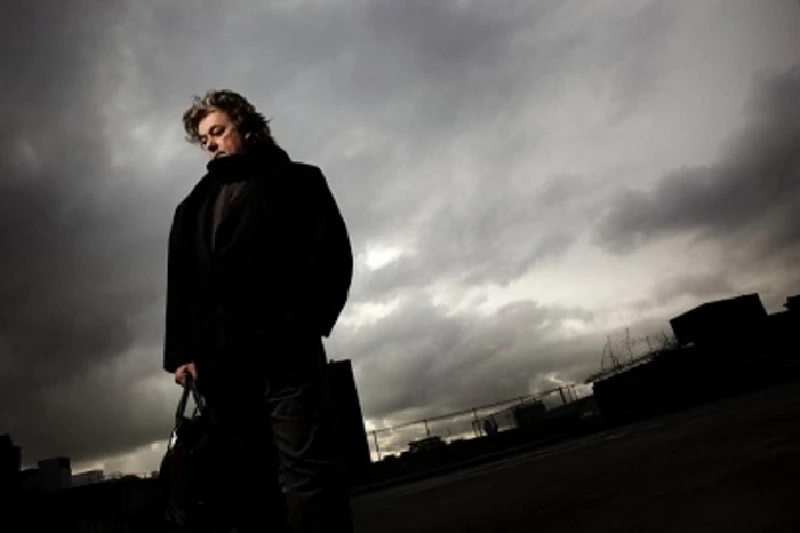
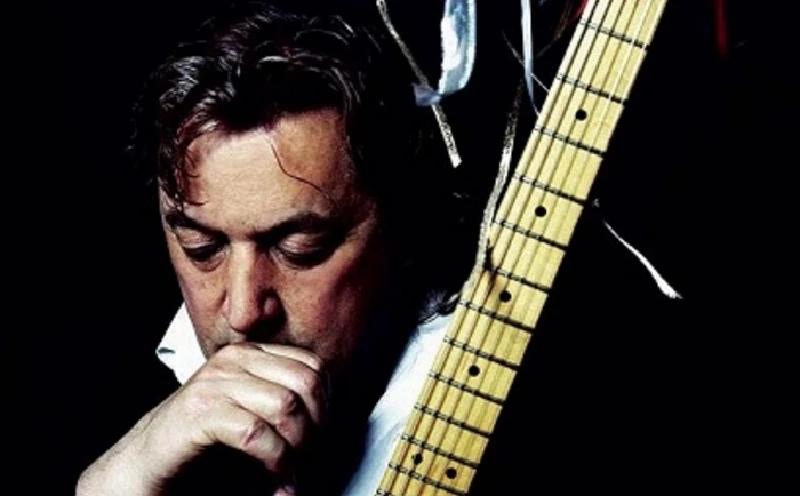
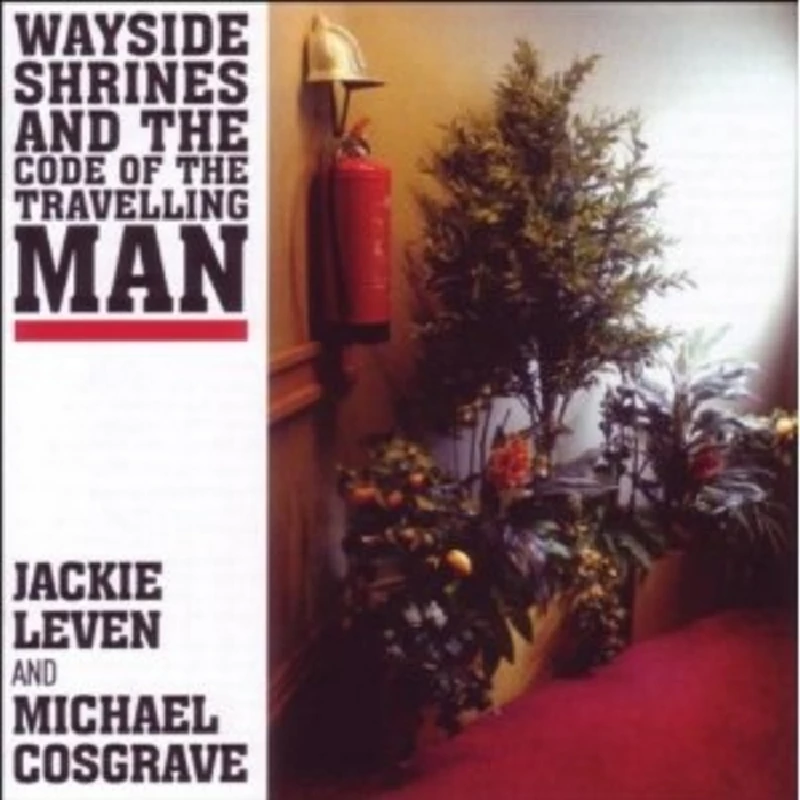
Visitor Comments:- |
| 772 Posted By: Phil , Southampton, England on 30 Jun 2015 |
|
Hi
Just a heads up on a couple of Jackie Leven tribute gigs being performed by long time Leven collaborators and brothers-in-arms Michael Weston King and Mike Cosgrave. The first is at Winchester Discovery Centre on Friday July 10th 2015 and is a fundraiser for www.qe2activitycentre.co.uk. The second is in Birmingham on Sunday 12th July 2015. Full details at www.michaelwestonking.com. Half the show will be Jackie Leven songs; the other half will be songs by another great songwriter, Townes van Zandt.
|
profiles |
|
1950-2011 (2011) |
| Ben Howarth and his brother Charles pay tribute to Scottish singer-songwriter Jackie Leven, who died in November |
live reviews |
|
Green Note, London 28/5/2008 |
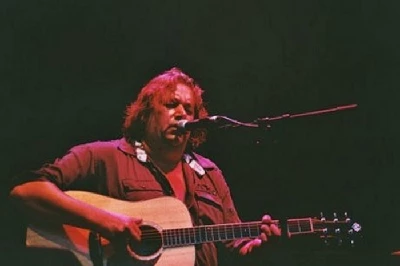
|
| At the tiny Green Cafe in London, Ben Howarth sees former Doll by Doll front man and still under-rated singer-songwriter Jackie Leven play an intimate, but typically charismatic set |
reviews |
|
Shining Brother / Shining Sister (2003) |
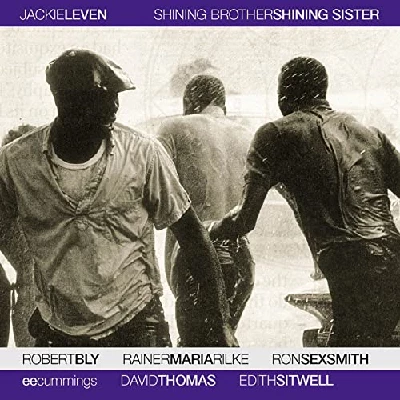
|
| Eclectic 8th solo album from former Doll by Doll frontman, Jackie Leven, which finds him taking in elements of hip hop , waltz and poetry |
| Great Songs From Eternal Bars (2001) |
most viewed articles
current edition
Carl Ewens - David Bowie 1964 to 1982 On Track: Every Album, Every SongArmory Show - Interview with Richard Jobson
John McKay - Interview
Colin Blunstone - Thalia Hall, Chicago, 16/7/2025
Billie Eilish - O2 Arena, London, 10/7/2025
Bathers - Photoscapes 1
Visor Fest - Valencia, Spain, 26/9/2025...27/9/2025
Loft - Interview
Sir Tim Rice - Interview
Robert Forster - Interview
previous editions
Manic Street Preachers - (Gig of a Lifetime) Millennium Stadium, Cardiff, December 1999Heavenly - P.U.N.K. Girl EP
Beautiful South - Ten Songs That Made Me Love...
Oasis - Oasis, Earl's Court, London, 1995
Peter Perrett - In Dreams Begin Responsibilities Interview Part One
Boomtown Rats - Ten Songs That Made Me Love....
Coldplay - Wembley Arena. London, 16/8/2022
Prolapse - Interview
Pixies - Ten Songs That Made Me Love...
Trudie Myerscough-Harris - Interview
most viewed reviews
current edition
Davey Woodward - Mumbo in the JumboSick Man of Europe - The Sick Man of Europe
Lucy Spraggan - Other Sides of the Moon
Amy Macdonald - Is This What You've Been Waiting For?
Phew, Erika Kobayashi,, Dieter Moebius - Radium Girls
Bush - I Beat Loneliness
Suzanne Vega - Flying With Angels
Alice Cooper - The Revenge of Alice Cooper
Blueboy - 2
Cynthia Erivo - I Forgive You
Pennyblackmusic Regular Contributors
Adrian Janes
Amanda J. Window
Andrew Twambley
Anthony Dhanendran
Benjamin Howarth
Cila Warncke
Daniel Cressey
Darren Aston
Dastardly
Dave Goodwin
Denzil Watson
Dominic B. Simpson
Eoghan Lyng
Fiona Hutchings
Harry Sherriff
Helen Tipping
Jamie Rowland
John Clarkson
Julie Cruickshank
Kimberly Bright
Lisa Torem
Maarten Schiethart